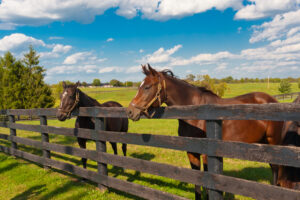A Dutchess horse farm is not a horse farm, a judge has ruled, when it comes to Chapter 12 bankruptcy.
On May 24, U.S. Bankruptcy Judge Cecelia G. Morris granted a request to dismiss a Chapter 12 petition filed by Barbara Giordano Leonaggeo, the operator of Juggernaut Farms in Stanfordville.

Leonaggeo and her husband, Roger, have been operating a horse farm on the 24.1-acre property for 50 years, according to her affidavit. They breed, train, appraise, and board horses and offer riding instructions.
Leonaggeo petitioned for Chapter 12 protection in February and declared $1,260,403 in assets and $214,092 in liabilities.
Chapter 12 bankruptcy is a streamlined process that is less expensive and less complicated than the traditional Chapter 11 reorganization and is tailored specifically for family farmers and family fishermen.
Two creditors challenged the bankruptcy. M-M2 RE Holdings 1 and M-M2 RE Holdings 13, of Salt Point, claim they are owed $258,645 secured by the homestead and the stable area.
The creditors, who had filed a foreclosure action in Dutchess Supreme Court, argued that Leonaggeo is exploiting Chapter 12 for the automatic bankruptcy stay that suspends lawsuits and other efforts to collect debts.
They claimed she has not operated a farm for at least three years because she has not bred any horses in that time, the boarding income is negligible, and she has no plans to harvest her cedar trees.
They also claimed she has inflated the value of her properties.
To qualify as a family farm under Chapter 12, Judge Morris ruled, the farm must produce regular income and include activities such as farming, dairy farming, ranching, tillage of soil, raising crops and producing poultry or livestock.
Courts also consider whether a debtor bears the inherent risks of farming, such as cyclical weather.
Some courts have treated horse breeding, boarding and training as service-oriented businesses that do not produce agricultural goods for consumption and are only marginally affected by the uncontrollable conditions traditional farmers face.
Other courts have ruled that the horse business does involve farming risks, Morris said, but in those cases the farms also grew feed and raised horses to maturity to sell as livestock.
Here, Judge Morris found, Leonaggeo does not produce crops or livestock and is “largely providing a service.”
The judge also noted that Leonaggeo’s plan to pay creditors relies on a speculative sale of the stable area.
“Where the value of the property to be sold is heavily debated and unsubstantiated,” she said, “it would be hard for this court to find the probability of payment to be reasonable.”
Leonaggeo is represented by Rochester attorney David H. Ealy. The M-M2 creditors are represented by Wappingers Falls attorney Mary K. Ephraim.






















